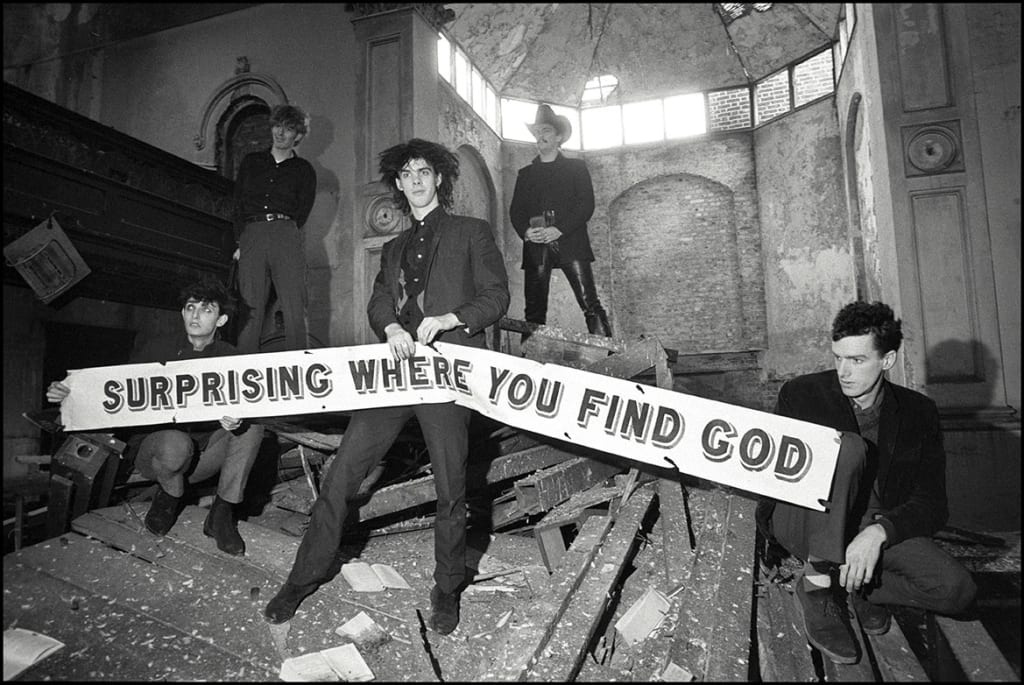
I've never been a huge fan of poetry, per se, but I do miss going to poetry readings at coffee shops. I would always meet strange and creative types, and prior to the dominance of internet culture, much less cell phones, it was often a fruitful affair to go to a coffee shop and meet writers, artists, and musicians. As an artist myself, I found that I needed the reinforcement of creative energy in my field of range. Without that, regardless of if I liked the output of any of these folks, I end up feeling like I'm surrounded by zombies.
At a certain point, coffee shops became wifi stations for tech bros, and the only segment of social interaction that one could rightfully expect there would be for an employee to make polite small-talk (or in the case of Starbucks, to be obliged to forced talk about racism). Some of us, if we're lucky, will also witness people locking themselves in the bathroom for an hour to shoot up, or particularly delightful characters flagrantly watching porn with their morning coffee. Enter quarantine, and the world-wide pandemic, and the lack of creative energy even more palpable. This is why Nick Cave's Red Hand Files have become a sort of godsend to me.
The site initially began after three years of grieving, since Nick Cave had lost his 15 year-old son. The Red Hand Files were apparently a reflection of Cave's choice to engage his fans by answering their myriad of questions. Rather than focusing on his band, or self-promotional gestures (although the inevitable fandom will give way to music-related questions), Cave tends to lean towards answering inquiries of a more philosophical or spiritual nature, and he elucidates with such an avid vigor that sometimes, one can only wonder whether or not his answers were written in one unedited shot, or if they were carefully, poetically divined into existence. Of course, it's possible that there was a little from column A and a little from column B.
Without undermining Nick Cave's obvious international fame, it might still be safe that this series of 135 answers (to date) have "gone viral" to some degree. In particular, he may have put a portion of his 40 year career at stake in partaking in one of the more controversial topics of our time- that of cancel culture. He's called cancel culture "the antithesis of mercy", and thinks that people have lost their sense of humor and irony, and much worse. He even went on to defend Morissey's right to run his mouth about his unsavory feelings on immigration, and he spoke rather eloquently on the nature of music as it relates to being inevitably separate from the artist.
"Perhaps it is better to simply let Morrissey have his views, challenge them when and wherever possible, but allow his music to live on, bearing in mind we are all conflicted individuals – messy, flawed and prone to lunacies. We should thank God that there are some among us that create works of beauty beyond anything most of us can barely imagine, even as some of those same people fall prey to regressive and dangerous belief systems."
I should add that he speaks eloquently on how a song becomes owned by each individual listener who connects with it, and I identified with that resoundingly. I'm also in line with the following quote, although I tread differently than he apparently would:
"...in the world of ideas the sanctimonious have little or no place. Art must be wrestled from the hands of the pious, in whatever form they may come – and they are always coming, knives out, intent on murdering creativity."
I'll keep my opinions on freedom of speech, especially as it relates to anti-intellectualism, for another time. I've thoroughly enjoyed everything Cave's written so far. Whether it is a matter of interest to me or not, Cave's answers to fans' questions are a not-so-gentle reminder to get back to the source. While coffee shops may not be populated by a whole lot of artists compared to the past, and since the live music scene was dwindling in that department even before COVID knocked it out of the picture, Cave comes off like a wise old hermetic mentor during the storm.
That storm is a quiet one. Rather than ravaging people, it slowly grinds them into mediocre and shallow paths, and somehow coaxes so many into thinking this is how it is supposed to be. In a myriad of ways, creativity and general strangeness has become a social blemish that is less and less acceptable. Genuine musings have often become fodder for the purveyors of gossip, who cast out anything that is deemed "creepy", especially that of emotional rawness, and childlike, ecstatic sincerity.
Reading The Red Hand Files has been like medicine in a society that is in itself a disease that eats itself. It's not just the content, it's the attitude that seemingly bursts from the pages, and renders obsolete the prevalent naval-gazing self-conscious posturing that so many bits of contemporary writing are riddled with. It is a sort of benevolent stream of consciousness that seems to be at the root of Cave's writing, and that free-flowing methodology has been both healing and redeeming.
I could go on with quotations, and cite numerous pieces that have stood out. It's like Dorothy leaving Kansas, and color being restored in the land of Oz. Just at a glance, the pieces on "coaxing" creativity, creativity and suffering, encountering lost loved ones in dreams, belief in god, becoming vegetarian, giving up alcohol, regret, and identity, are especially prescient, in the sense that they feel like bits of wisdom that people eventually arrive at, but only through experience.
Among my favorites is the piece about honesty (especially after losing his son):
"...Because, you see, the world had done its worst. What harm was left to be done? What remained to fear? What was left to lose that I could not survive? I felt extraordinarily liberated by this, protected by the calamity itself and perversely invincible within my own vulnerability. Deception, artifice and keeping up appearances took up too much energy — I didn’t have the stamina for my own pretence [sic] and little patience for it in others."
...And also the inspiring and slightly tangential response to a question about Elvis:
"....These transformative moments encapsulate the religious nature of performance as they imitate the crucifixion and resurrection of Jesus Christ Himself. This narrative of suffering and rebirth is played out again and again within our own lives, but I believe it is captured most beautifully, within the musical performance itself. Through the boundless power of music, a performer transcends his or her own wretchedness by performing a kind of public exorcism and by doing so, transforms into a deity."
Full disclosure: I should say that I've never been a huge fan of Nick Cave. 20 years ago, I enjoyed some of the melodies and sound design. I liked that Einsturzende Neubauten's Blixa Bargeld played bass for The Bad Seeds. I liked the sound of The Birthday Party. I liked that Cave was part of a short-lived super-group called The Immaculate Consumptive with J.G. Thirlwell (A.K.A. Foetus, one of my top 5 favorites for sure), Marc Almond (Soft Cell), and Lydia Lunch. I liked that he did a song with Kylie Minogue about murder. I did really like Grinderman a lot, to be honest. It was all entertaining, but in general, I filed Nick Cave as a sort of one-dimensional character with a series of perfectly reasonable preoccupations that just, for some reason, didn't particularly carry him into fanatic territory for me.
That said, I can't say my opinion has certainly changed, but I am finding myself listening to various pieces of this peculiar Australian man's work, and I'm now more inclined to file him with Leonard Cohen (an artist I didn't like at first, but love now), rather than as a less caricatured Tom Waits (who I also like, but in small increments). Similarly, I'm not the most well-read scholar on poetry, not by a stretch, but I appreciate it's cultural value much more now, now that it is relegated to the likes of vaudeville and tap-dancing in terms of how society generally regards it. In those coffee shops 20 years ago, I used to mock poetry by doing Dadaist readings of things I'd overheard in a restaurant. Now I'd be more likely to sit and ingest more.
As such, thanks to The Red Hand Files, I'm looking back at Nick Cave's work with a level of depth, nuance, and appreciation that I hadn't had before, and my ears are perked up much more for what he's getting at. I may never get there, but I'm thankful for the process.
The world is experiencing a collective grief that Cave knows well, and without live music as his vehicle, he is participating in this ego dissolution, and remaining as a lighthouse keeper for the inevitable rebirth.
About the Creator
Arvo Zylo
A scattered history of writing, experimental music/art, DJing, psychic readings (healer, tarot and palm reader), hypnotherapy, graphology, etc. An occasional outlet for a few of my more accessible interests. https://linktr.ee/nopartofit






Comments
There are no comments for this story
Be the first to respond and start the conversation.